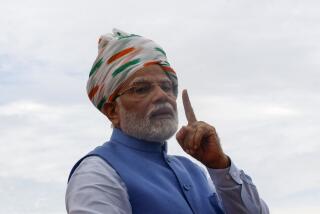Soviet TV--Escape From the Gulag : Glasnost update: Gorbachev unchained Soviet radio and TV, but fledgling capitalists have to scramble for the money to invest in their media projects.
- Share via
LENINGRAD, Soviet Union — Husband-and-wife TV team Vladimir and Natasha Maximov dream of becoming the Roone Arledge and Diane Sawyer of Soviet television.
Seeing new opportunities in a recent decree regarding radio and TV issued by President Mikhail S. Gorbachev, they plan to launch their own network and eventually challenge the state-owned broadcasting network for home viewers.
But over at state-run television in this Russian city on the Neva River, the mood is dismal. Long famous for its daring programs, producers at Leningrad TV fear that the new regulations will turn their once-outspoken station into the lap dog of the powers that be.
Gorbachev’s new regulations free radio and TV from the effective control of the Communist Party apparatus and give local governments, other political parties and public organizations access to the airwaves. The Maximovs see this as an official sanction of what their company had already started doing.
“If this decree were not made, what we are doing could be illegal,” Vladimir Maximov, president and chief producer of Neva TV, said in an interview.
The Maximovs formed their company at the end of last year after deserting Leningrad TV. Since then, they have produced two major charity telethons with original reports from Neva TV’s journalists. One telethon raised money for the Soviet Children’s Fund, and another showed gruesome footage of the effects of the Chernobyl nuclear disaster to encourage donations to help victims.
Each telethon was shown on central television and raised 100 million rubles, or $166 million at the official exchange rate. The Chernobyl telethon was also shown abroad.
With Gorbachev’s July 15 decree as a launch pad, the Maximovs now hope to expand their business into a new television network.
But with a staff of only 24 and a commitment to quality, the husband-and-wife team acknowledged that Neva TV will not be able to outpace state television right away, especially considering that more than 100 million people watch the main evening news program, “Vremya,” on state-run TV every day.
“It disturbs us that we cannot go on the air right away,” said Natasha Maximov, who is Neva TV’s main anchor. “We have many original ideas that should be shown to the public.”
The Maximovs were hesitant to give specific examples of stories they intend to broadcast. “In the new period of competition, we can’t give away our secrets,” she said. But the couple is confident of success.
“Our programs were the most popular programs when we were working in Leningrad Television,” Natasha Maximov boasted. “Of course our station will be the most popular.”
“Public Opinion,” the Maximovs’ best known show, was a great success until they left the Leningrad channel to follow what seemed at the time to be an outlandish plan to start their own television company. Now that their dream is becoming a reality, other correspondents are anxious to make the jump to a private venture as well.
“Some journalists from Leningrad Television are already asking if they can join us,” Vladimir said.
But at “Fifth Wheel,” a popular news magazine show on the state-run Leningrad channel, producers are still trying to figure out how the new regulations will affect their program, which is known for breaking long-held taboos.
For decades, Soviet television has been a powerful tool for disseminating the official line on domestic and world events. Since Gorbachev launched his policy of glasnost, or openness, television journalists such as the producers of “Fifth Wheel” have pushed further and further the limits of what is acceptable. But they have not been able to totally escape the grip of the government.
“The main question blocking our independence has always been a lack of material resources,” said Natalya Serova, a “Fifth Wheel” producer. “We are not even the owners of our own program now.”
Producers at “Fifth Wheel”--whose episodes have included a conversation with an executioner who carried out Stalin-era death warrants and an expose on the KGB state security police--said that they were worried that the new rules might limit the independence they have struggled to obtain in the two years since they went on the air.
Specifically, “Fifth Wheel” producers complain that the new decree gives too much control to Gosteleradio, the state monopoly that governs broadcasting, by empowering it to issue licenses. They also argue against the clause in Gorbachev’s decree that forbids journalists to spread their personal political views.
Another negative side to the new regulations, the producers say, is that they require local governments, political parties or social organizations to pay broadcast costs--an impossible requirement for most cash-starved Soviet organizations, and a boon for well-entrenched bureaucracies such as the Communist Party.
The regulation also makes it clear that the central government is not willing to hand its stations over to liberal mayors such as Anatoly Sobchak of Leningrad or Gavriil Popov of Moscow. It outlaws “any acts taken by republican, territorial or regional bodies without coordination with the U.S.S.R. State Committee for Television and Radio,” otherwise known as Gosteleradio.
Journalists here argue that this effectively takes Leningrad Television away from the city of Leningrad.
Before Gorbachev’s decree, as part of Leningrad TV, “Fifth Wheel” in principle had three bosses--the Leningrad city council, the regional council and Gosteleradio. But in practice, three bosses meant no bosses because no one body had full control.
Now the station is only under the hand of Gosteleradio, which Leningrad broadcasters say can be very heavy.
“This law is against us,” said Sasha Krivonos, another “Fifth Wheel” producer. “Three bosses were easier. We are still free right now, but once Gosteleradio realizes its new power, that freedom might be taken away.”
Krivonos and other “Fifth Wheel” producers say that the best option for their program will be to become an independent show on a new Russian television network, which Russian President Boris N. Yeltsin has proposed. Yeltsin has said Russia’s broadcasting stations will be independent of the central government.
“We’re eager to get out from under Gosteleradio,” Serova said. “The only things Gosteleradio has ever done for us were bad.”
Once “Fifth Wheel” has independent status, it will need to buy its own equipment instead of using state-owned equipment, as it does now. So the issue of funds--and where to find them--is the biggest problem for the producers of Neva TV and “Fifth Wheel” and other broadcasters trying to strike out on their own.
“It was easy for Gorbachev to make such a decree, because he knows no one here has the money to make truly independent television,” said Sasha Krivonos.
Unlike Western television, Soviet TV is not supported by advertising, which is just being introduced here. But in the meantime, would-be television companies need to make money somehow.
“To compete, we need top quality equipment, and for this we need money, hard currency--and lots of it,” Vladimir Maximov said.
Loans are almost impossible to obtain, so Neva TV and “Fifth Wheel” are hoping that wealthy Western companies will donate equipment in exchange for free advertising.
Other television companies, such as one in the city of Novgorod, are raising money by charging viewers for cable television broadcasts.
But small audiences of cable TV viewers are not attractive to producers of programs who are used to huge audiences.
Despite their complaints, “Fifth Wheel” producers said that the changes going on in television will probably work out in their favor.
“This is the end of monopoly of television in the Soviet Union,” Krivonos said. “Competition has started, and the viewers will win.”
More to Read
Sign up for Essential California
The most important California stories and recommendations in your inbox every morning.
You may occasionally receive promotional content from the Los Angeles Times.













